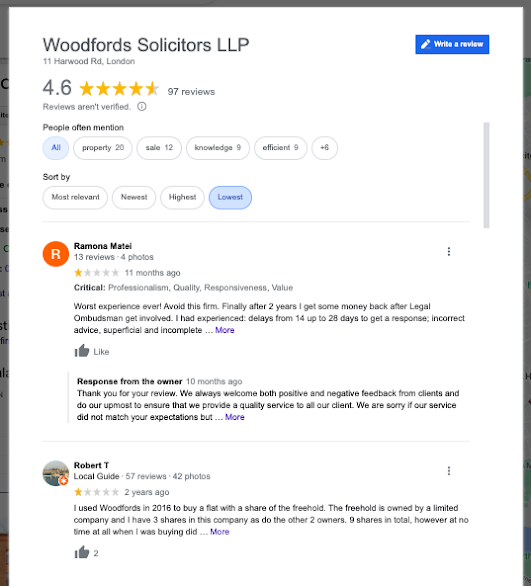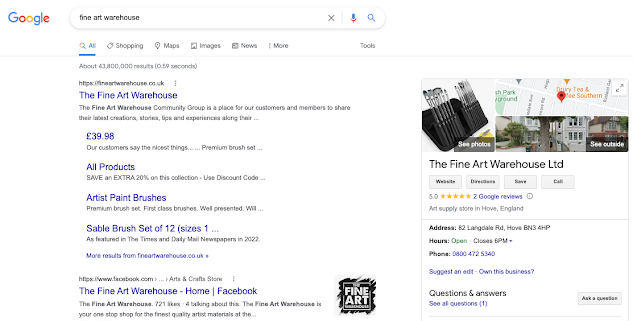Given that it is now universally accepted that reviews - great reviews and a great overall score - not only drive business by themselves but reinforce all your other marketing, whether that be by personal recommendation, your own advertising and PR, social media or the myriad of other avenues that businesses use to attract custom in 2023, it is essential to do the best your business possibly can. Using this article as a checklist, you can score your business. Anything less than 9 out of 10 and maybe you should be speaking to us?
1. Does your business have more than 200 Google reviews (per location if you have more than one)?
2. Is your business scoring 4.8 or more (again, in each location)?
3. Does your business have stars in Google local search(es)?
4. Is your business shown in the Google 3-pack (in all locations)?
5. Does your business rank in the top 3 in any relevant Google search?
6. Is your business fully compliant with UK law when it comes to reviews?
7. Are you using your reviews to maximum effect in your other marketing?
8. Are you getting at least half of those who do business with you to post a review on your own website? And are you getting at least half of them to copy their review to Google?
9. Are you expending time, money and effort on the wrong review mechanism?
10. Do you have a safety net in place in the event of a customer posting an inaccurate or potentially misleading review?
How did your business do? 10 out of 10? You're almost certainly a HelpHound client. Any less - even 9 - and we would encourage you to read on.
Each point in more detail...
1. Does your business have more than 200 Google reviews (per location if you have more than one)?
Some will view this number - 200 - as a lot of reviews. It is a lot if you don't have a review management strategy in place. But it is a key number. Why? It's a case of simple maths: if you have 10 five-star Google reviews and only two people post a one-star review your score will drop to 4.5. That alone may take you under some of your competitors. If you have 200 reviews you become pretty well immune to the odd negative, at last in terms of your overall score - but even if this is the case please read on, because any one-star review will damage inbound calls and clicks through Google search.
2. Is your business scoring 4.8 or more (again, in each location)?
Back in the day 4 out of 5 used to be a pretty decent score, then businesses became more review savvy and 4.5 would be needed to look good against the competition. These days, when many businesses are doing all they possibly can, some not so legally - to come out on top - or at least as near as possible to the top, a business needs to aim to get as close to the 'perfect 5' as possible.
3. Does your business have stars in Google local search(es)?
Look at the screenshot above. You will be familiar with it - it's a Google local search of the kind performed by almost everyone looking for a business these days, even if they've been personally recommended that business or found it through any other avenue (Marketing/advertising/PR etc). Why does only one of the three businesses have a Rating and stars? You might be surprised by just how many people think - erroneously - that those are from the business's Google reviews; they're not, they're taken straight from the business's own reviews on the business's own website...
Of course, you could achieve a similar first impression by simply importing Google reviews into your website via a widget, but this would be to ignore the value of owning your own customer reviews and would be missing the vital opportunity to have your reviews moderated pre-publication (see point 10, below).
4. Is your business shown in the Google 3-pack (in all locations)?
Google guard the reasons businesses qualify for the 3-pack (as well as ranking in organic search) very closely, but over ten years of experience and many years of following client experiences shows us that hosting your own reviews has a fundamental bearing on this. Again, many consumers see this as Google somehow qualifying the business; what we know is that businesses hugely value appearing here.
5. Does your business rank in the top 3 in all relevant Google searches?
6. Is your business fully compliant with UK law when it comes to reviews?
This is important, not just because breaking the law runs a risk of a fine and other sanctions by the CMA, but because any law-breaking will be so obvious to any competitors and they will find it hard to resist mentioning to prospective customers when in competition. It is illegal, in the UK, to...
- select customers to invite to post reviews (commonly known as cherry-picking)
- pre-qualify customers before inviting them to write a review (by using another review site or by asking them to complete a questionnaire, for instance)
Many businesses get reviews to Google and that's it. Getting your own reviews to your own website means you are able to broadcast them across many different media. Here's just one example...
First, the review on the business's own site...
Then on Google...
And then contributing towards an industry award...
And no reason to stop there - onwards to social media (Twitter/Instagram/TikTok) and conventional media (PR/advertising/marketing).
8. Is your business getting at least half of those who do business with it to post a review on its own website and then at least half of those who do so to copy their review to Google?
That should be the aim.
9. Is your business expending time, money and effort on the wrong review mechanism?
Sites like Trustpilot, Yelp and Feefo were fine before Google reviews became omnipresent but those days are behind us now. Your business's reviews solution needs to be Google-focussed. No matter what review sites' salespeople may say, nothing beats the power, influence and sheer visibility of Google reviews.
10. Does your business have a safety net in place in the event of a customer posting an inaccurate or potentially misleading review?
Last, but very firmly not least, comes the insurance so vital for any professional or service business: moderation. A well-written but inaccurate or misleading one-star review won't hurt a branch of Mcdonald's or an online retailer but it can snuff out calls and clicks for the likes of legal, financial or medical businesses overnight. Businesses like this - accountancy, recruitment, estate agency and so on - rely very heavily on their online reputations for new business and so need to take every possible precaution.
Moderation - the act of having every review independently checked before publication - is an essential service for such businesses. It won't prevent a fair and reasonable criticism from being published but it stands a ninety-percent-plus chance of diverting an unfair, inaccurate or potentially misleading review.










































